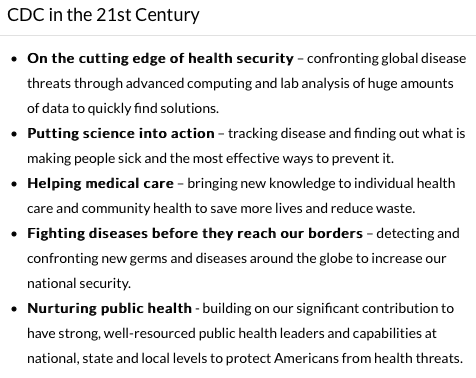As a fiscal conservative I am loath to see the expansion of our federal government, yet we may be at one of those rare inflection points in our country where such expansion is appropriate. With the recent appointment of Dr. Brenda Fitzgerald as head of the Centers for Disease Control, it is time to reflect on one of the biggest heathcare threats in our nation; the financial wellbeing of our hospitals.

The CDC Mission webpage displays a medical xenophobia that is pervasive throughout the industry. It describes an organization filled with brilliant microbiologists and policy wonks, with no regard for finance or economics. This is expected due to the fact that the CDC is handed their financing from Washington, DC as well as the structure of our educational system. Across town the Emory Masters of Public Health program does not list Finance or Economics as part of their curriculum, which is I am sure typical, nor is there room in medical education for such topics.
Reuters is a rare organization who has acknowledged concern over the riskiness of the hospital finance environment, concluding “I don’t know that it’s quite in the category of frothiness, but it’s getting close.” In an environment of rising interest rates and declining quality of credit, hospitals may have significant difficulty rolling their debt forward in a manner that allows sustainable operations. Within this financial backdrop there is significant likelihood of the current crisis in rural hospitals escalating.
The environment in Maine is perhaps a typical example. Maine Medical Center in Portland may be the only viable healthcare organization in the state, partly due to the population density and local wealth. As I-95 winds north, hospital systems in Augusta and Bangor are looking increasingly weak. Both systems seem caught in a downward spiral of “junk” bond downgrades. Further weakness is likely due to the “negative outlooks” and continued losses from operations. Augusta may be the first capitol city without a hospital.
Across the river in Augusta lies Togus VAMC. If civilian employees at Togus can not get access to quality healthcare locally, employees may flee. If so, Togus may fail in its mission to deliver quality care to veterans. Weakness in hospital finances may lead to contagion within other public and private organizations within those communities. VHA is in a unique position to offer healthcare to their employees and prevent any healthcare access contagion among their stakeholders.
At the turn of the 20th century, our banking system suffered cycles of defaults that wiped out the savings of Americans. In order to stop these losses, the FDIC was born and since then not one depositor has lost their principal. The FDIC has a small army of regulators who monitor and evaluate the financial health of banks. If one is failing, they move swiftly to ensure that depositors have access to their money, and they are busy. Today, even the most hardened conservative will have trouble arguing against the value of this government intervention.
As Dr. Fitzgerald enters the honeymoon period of her new position, it may be time to reevaluate the threats to our nation’s health. The greatest threat may not be an African microbe, waning acceptance of vaccines, or data that is not big enough. The greatest threat may be one of perception. The CDC needs to consider all threats, even ones previously ignored such as finance and economics.
It may be time for the CDC to duplicate the work done by the FDIC, and insure access to hospitals and healthcare services remains available for all Americans. As hospitals fail, it is time for our government to step in and transfer those assets to a more viable organization. A more liberal mind might even suggest nationalizing distressed institutions into a fabric of federal hospitals, to allow for basic and primary medical services to be provided in those communities, complete with a helipad to whisk patients away to a center of excellence. Whereas our central bank is the lender of last resort for something as ephemeral as money in a bank account, there is no reason our federal government can not grant the same priority for an asset that is much more real, our health and wellbeing.

A novel idea. If not the CDC, an FDIC for hospitals seems increasingly necessary. The Medicare deeming authorities (are there any besides The Joint Commission and DNV-GL Healthcare?) are the bodies currently posing as experts in hospital quality certification, and might do a first pass on financial viability. Would be a huge role to accept a failed institution, convert it to a state or federal enterprise, and position it for a viable role. This piece is certainly food for thought!
LikeLike